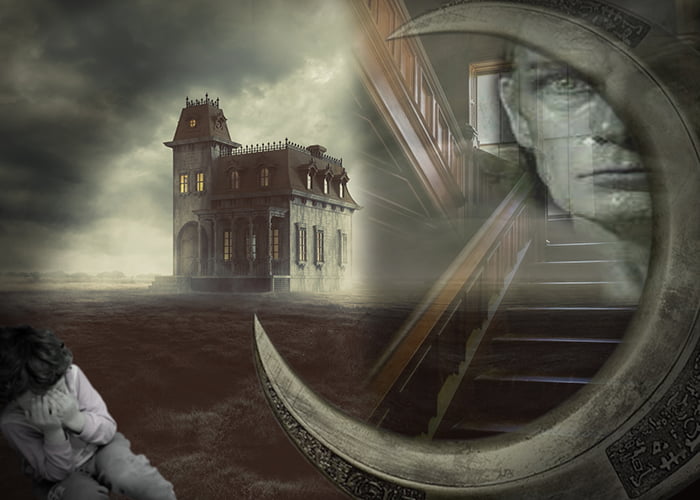
THE DARK CHILD, THE GENTLEMAN, AND THE KNIFE
I am on the edge of a plain, a bare place, and in its center is a dark-haired child, foreign. He is lying down, almost in a half-crawling position although he is not crawling, as in Christina’s World. He is quite pale; needs help and protection; does not know and understand the world he is in. Italian? Japanese?
The child passes completely out of the dream as I move on to a threat made tangible, an evil presence in a many-storied Victorian house to the right of the plain. The house and the boy are connected; I know that. The house is smotheringly English of that period, full of draperies, fringed tablecloths, reds and gold, crowded furniture. It is opulent (although a bit shabby) and overwhelming, physically overwhelming. The evil person—thoroughly, absolutely evil—is an English gentleman. He is cultured, calm, cravated. Older. I think quite clearly in the dream the horrible truth that evil may take this face: thoroughly genteel and civilized. It is, indeed, the perfect cover and somehow even more hideous and despicable. The evil is palpable in the house and I know I must kill the man. This is an absolute. I do not question for a moment.
The chase in the house is stealthy and exciting, a fine bit of cinema suspense. I am moving through the rooms cautiously, looking for the man. I catch a glimpse of him through a French door. I follow, mounting stairs. But when I am climbing and cannot retreat, I realize he is behind me. He has maneuvered me. He revealed himself on purpose and made me believe he ascended.
Now I am the quarry. I have no choice but to continue climbing, to go as high as I can to the cupola of a tower. It is somehow more than a cupola, open and large. Again I am conscious of inevitability. I am tense and fearful, but I know this must happen and my complete resolve is a kind of calmness.
When he confronts me in the tower, I have a weapon. It is simply there and seems of great power—that is, it has a magical, sacred aura. A talisman. It is a curved oriental knife, but small, like a miniature sickle. It is broader at one end of the blade and highly ornamented, etched with elaborate designs. It is extraordinarily beautiful and dangerous.
I am not sure exactly how I hold it, but I can. Perhaps that is part of its beauty: the seamlessness of the blade and the handle. This weapon becomes an extension of your hand, your body. (I feel on waking that this weapon exists, though I do not remember ever seeing one. I believe that if I went to the library, I would find a photograph of the very image in my dream. It’s almost as though this library discovery has become a dream image. Later and awake, I see myself with the book.)
I kill the man. Period. Again, part of the extraordinary character of this dream is my lucid thought about the action as it happens. How incredibly difficult for me in real life to kill a person—particularly with a blade, of which I have a horror. Yet in the dream complete rightness lives with horror. I do not have choice. This thing must be done, and thus as I kill him there is a sort of elation. No, that is not exactly the word. A dark completion. A finality, a closing, worth the price. Myself acting, willing, although I am also only fulfilling some determining force outside me. 1988
I suppose that is the best we can hope for: to feel ourselves agents even as we move through a world we do not, and cannot, control. But why did the dream concentrate on evil? I could not have had this dream, had the privilege of feeling such power, a good power, if I had not been murdering.
I did find the knife in the library.
